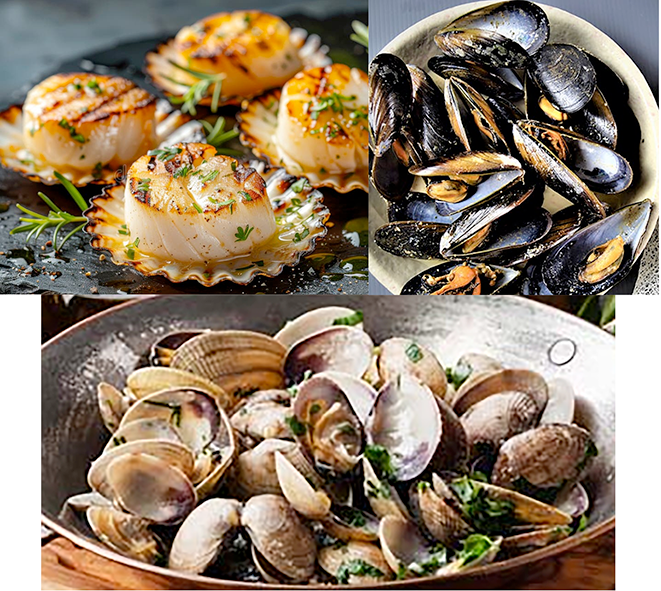FabulousFusionFood's Shellfish-based Recipes 3rd Page
 Cooked scallops and mussels, top and clams (bottom).
Cooked scallops and mussels, top and clams (bottom).
Welcome to FabulousFusionFood's Shellfish-based Recipes Page —Shellfish, in colloquial and fisheries usage, are exoskeleton-bearing aquatic invertebrates used as food, including various species of molluscs, crustaceans, and echinoderms. Although most kinds of shellfish are harvested from saltwater environments, some are found in freshwater. In addition, a few species of land crabs are eaten, for example Cardisoma guanhumi in the Caribbean. Shellfish are among the most common food allergens. In my usage here I'm excluding crustaceans (eg prawns, lobsters, crayfish, crabs and barnacles) which have their own page. Though this page deals mainly with molluscs, I am excluding cephalopods (squids, octopodes, cuttlefish) but including gastropods (aquatic species such as whelks and winkles; land species such as snails and slugs). So my usage is closer to the regulatory definition of 'shellfish', which is often narrowly defined as filter-feeding molluscs such as clams, mussels, and oyster to the exclusion of crustaceans and all else.
Archaeological finds have shown that humans have been making use of shellfish as a food item for hundreds of thousands of years. In the present, shellfish dishes are a feature of almost all the cuisines of the world, providing an important source of protein in many cuisines around the world, especially in the countries with coastal areas.
 Examples of edible molluscs, top layer gastropods: abalone, limpets, winkles, conch, whelks.
Examples of edible molluscs, top layer gastropods: abalone, limpets, winkles, conch, whelks.Bottom layer bivalves: mussels, oysters, cockles, scallops and clams.
Many species of molluscs are eaten worldwide, either cooked or raw. Some mollusc species are commercially exploited and shipped as part of the international trade in shellfish; other species are harvested, sold and consumed locally. Some species are collected and eaten locally but are rarely bought and sold. A few species of molluscs are not commonly eaten now, but were eaten in historical or prehistoric times.
Some of the most commonly consumed molluscs and marine gastropod snails include: abalone (several species), true limpets, winkles (including periwinkles), conchs, several species of Calliostoma top snails, whelks, sea snails, bivalves (these have two shells and include: ark clams, true mussels, pen shells, true oysters, true cockles, scallops, venus clams, Mectridae clams, razor clams, bean clams, chitons). Note that abalone, limpets, winkles, conchs Callliostoma top snails, whelks and sea snails are all gastropods ie true snails. Some also include edible land snails such as escargot and giant African snails in this list.
The alphabetical list of all the shellfish-based recipes on this site follows, (limited to 100 recipes per page). There are 210 recipes in total:
Page 3 of 3
| Tom Yum Hed (Mushroom Tom Yum) Origin: Thailand | White Curry Origin: Fusion | Zarzuela de Mariscos (Seafood Zarzuela) Origin: Spain |
| Tom Yum Het Mangsawirat (Mushroom and Lemongrass Soup) Origin: Thailand | White Oyster Sauce Origin: British | Zupa di Pesce (Seafood Soup) Origin: Cayman Islands |
| Trout Kedgeree Origin: Britain | Wild Mushroom Stew Origin: Britain | |
| Vermicelli with Chicken and Wood Ear Mushrooms Origin: China | Xarém Origin: Portugal |
Page 3 of 3